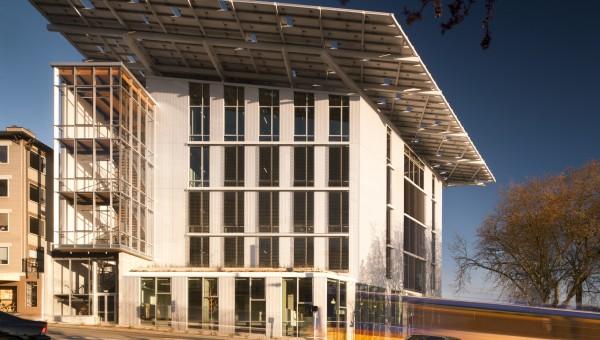The Bullitt Center in Seattle, which some say is the world's "most efficient" office building is not only influencing how other structures are built, it is contributing to revisions of codes and public policy.
The building’s design was made possible by Seattle’s Deep Green Pilot Program that allows builders to deviate from standard codes to build more sustainably. For example, the building was allowed to add two to three feet to the height of each floor to allow more daylighting. Neighbors objected to the additional 10 feet in overall building height, but the program permitted the non-conforming design.
Some of the building’s code deviations have been incorporated into the city code. For instance, the city council and the mayor had to approve changes to the building code to allow permits for “sustainability features.” This move allows the building’s solar canopy to extend all the way to the property line.
Bullitt Foundation, the environmental group that owns the building, recently signed a first-in-the-nation agreement with the local utility that will allow the foundation to sell Seattle City Light the energy it is saving or “negawatts.” The arrangement, known as MEETS (metered energy efficiency transaction structure) could be a pioneer in drawing investment funds to energy-efficiency projects.
Bullitt is also seeking final approvals from the county and state to turn the building into its own water district. That designation would allow tenants to drink rainwater collected on site and treated in the building’s basement.
(http://grist.org/business-technology/how-one-building-is-changing-the-world/)
Related Stories
Codes and Standards | Jun 3, 2021
Conversion of large office buildings to residential will require revamped regulations
Post-1960 offices present ventilation, daylighting, and other challenges.
Codes and Standards | Jun 2, 2021
Dept. of Energy releases EnergyPlus and OpenStudio updates
New features include Python Plugin features and additional tabular reporting options.
Codes and Standards | Jun 1, 2021
Federal plan to double Canadian lumber tariffs draws intense criticism
Builders advised to stock up to deal with shortages.
Codes and Standards | Jun 1, 2021
Passive House standards proving their worth in multifamily sector
Energy performance beats conventionally built by 32% to 58%.
Codes and Standards | May 27, 2021
Pittsburgh combats construction fraud
Crackdown on tax, insurance, and workers’ comp malfeasance.
Codes and Standards | May 26, 2021
Proposal to add photovoltaic panels to the R2 Standard for electronics recycling
Hundreds of facilities in 33 countries could begin recycling PVs.
Codes and Standards | May 25, 2021
International Energy Agency lays out roadmap to net zero
Focus is on energy generation, but building efficiency also plays a role.
Codes and Standards | May 24, 2021
Biden Administration will make new investments in building energy efficiency
Focus on grid-interactive buildings; Energy Star expansion; new targets for energy, water reduction.
Codes and Standards | May 20, 2021
Solar panel trade group issues guidelines to rid use of components built with forced labor
Growing concern that PV industry is dependent on work camps in China.
Codes and Standards | May 19, 2021
Smart electric panels can aid transition to renewable energy
Allow customers better control of circuits; utilities can better manage demand.

















